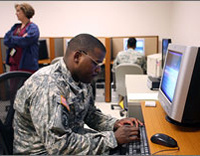 Pentagon delayed screening troops returning from Iraq for mild brain injuries for two years
Pentagon delayed screening troops returning from Iraq for mild brain injuries for two yearsBy Gregg Zoroya, USA TODAY
Air Force Col. Kenneth Cox said in an interview that the Pentagon wanted to avoid another controversy such as the so-called Gulf War syndrome. About 10,000 veterans blamed medical conditions from cancer to eczema on their service.
The Pentagon did not acknowledge the syndrome until Congress created a committee to study it in 1998.
For troops who think they may have a condition not designated as war-related, Cox said, often "they’re reacting to rumors, things that they’ve read about or heard about on the Internet or (from) their friends." (continued…)
That uncertainty, Cox said, means "some individuals will seek a diagnosis from provider to provider to provider." It also makes treating veterans "much more difficult and much more costly," he said.
"That’s baloney," says Rep. Bill Pascrell, D-N.J., founder of the Congressional Brain Injury Task Force. "There was no need to delay this."
In a January 2006 report, scientists at the federal Defense and Veteran Brain Injury Center urged that troops be screened for TBI "immediately." The Pentagon will soon require that troops be checked as they come home, according to Cox.
Cox says research shows screening is the most appropriate step.
An Army mental health report last month indicated that 11% of 2,195 soldiers surveyed in Iraq and Afghanistan show signs of mild brain injury, but fewer than half were identified and evaluated in the field.
That’s more proof of the need to screen troops as they leave Iraq, says Air Force Lt. Col. Michael Jaffee, a neurologist who heads the brain injury center. Screening includes a series of questions about a soldier’s experience and symptoms relating to head injury, such as balance or memory.
About 1.6 million U.S. troops have served in Iraq.
Sen. Patty Murray, D-Wash., says, "Here we are five years into this war, and the Pentagon is just now coming to grips with how to track and treat those … with TBI." Murray is a member of the Senate appropriations subcommittee that oversees spending on veterans issues.
One concern, Cox says, was that mild TBI symptoms often resemble simple problems such as a lack of sleep or stress.
Screening for brain injury is vital to the health of troops in the field, says Staff Sgt. Marcus Brown, 30. He was transferred to Fort Carson, Colo., where the Army has operated a pilot screening program for traumatic brain injury since 2005. There, Brown was screened for brain injury for the first time after serving two tours in Iraq and surviving three IED blasts.
Doctors need to screen soldiers for brain injury as they leave the war zone, Brown says, because "most soldiers, especially NCOs (noncommissioned officers), are not going to show any type of weakness in front of their soldiers."

"Go to Original" links are provided as a convenience to our readers and allow for verification of authenticity. However, as originating pages are often updated by their originating host sites, the versions posted on VT may not match the versions our readers view when clicking the "Go to Original" links.
(In accordance with Title 17 U.S.C. Section 107, this material is distributed without profit to those who have expressed a prior interest in receiving the included information for research and educational purposes. VT has no affiliation whatsoever with the originator of this article nor is VT endorsed or sponsored by the originator. Any opinions expressed by the author(s) are not necessarily those of VT or representative of any staff member at VT.)
ATTENTION READERS
We See The World From All Sides and Want YOU To Be Fully InformedIn fact, intentional disinformation is a disgraceful scourge in media today. So to assuage any possible errant incorrect information posted herein, we strongly encourage you to seek corroboration from other non-VT sources before forming an educated opinion.
About VT - Policies & Disclosures - Comment Policy



